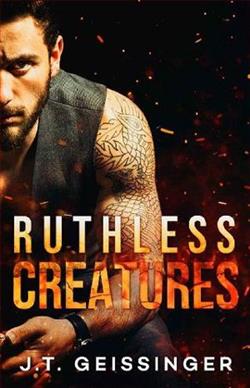Page 16 of Darkness Bound (Night Prowler 5)
Her mother had always tried to get him into something else, add a little variety to his wardrobe, but her father steadfastly refused. Some things never change, her mother had said in that particular way she had, laughing and light but angry at the same time, vibrating with a dark undertone that Jack’s childhood self never understood, but was afraid of nonetheless.
She swallowed around the lump in her throat. “Dad. Hi. You’re looking good.”
He cracked a lopsided smile and pushed open the screen door. “Not bad for an old-timer,” he agreed, and pulled her into a hard, one-armed hug.
He released her almost immediately. They stood there in awkward silence for a moment, avoiding each other’s eyes.
“Well, don’t just stand there on the porch gathering dust,” he said, sounding even more gruff. “Come on in.”
He picked up her duffel bag, then went inside. Jack followed him, letting the screen door bang shut behind her, feeling as if gravity had exponentially intensified and every step she took inside pressed her down harder and harder against the Earth.
Along with her father’s wardrobe, the house hadn’t changed. The downstairs rooms were bisected at waist level by dark wood wainscoting; flowery wallpaper climbed to the ceiling in a haphazard sprawl; and somber wood and tasteful, understated floral-print furniture had been selected to match. The house had two stories, narrow and dimly lit, with a ragged garden out back and a white picket fence that enclosed the yard in an ironic sham of hominess.
Jack followed her father into the kitchen with the odd sensation she was traveling back in time to one of those fifties black-and-white TV shows. Father Knows Best transplanted to modern day Queens. She’d never realized how self-consciously retro the place was, how hard it tried to be individual and colorful, with its checkerboard tiles and sparkly Formica countertops, the cupboards painted turquoise and the appliances that matched.
This room had been her mother’s domain, and the eclectic décor reflected it. Gazing around it now, it occurred to Jack for the first time that this room was a big middle finger to the rest of the house . . . the house her pushy, iron-willed grandmother had decorated when the family had first moved in and her new daughter-in-law was away spending some quality time in a room with padded walls.
Jack’s father set her bag down near the back kitchen door, almost as if to reassure her she could make a quick getaway if needed.
How well he knew her.
Like a pair of cats warily circling, they cautiously took seats opposite each other at the small table. Each waited for the other to speak first.
Finally, after playing with the salt shaker for a few excruciatingly silent moments, her father said, “You look thin. You eating?”
“I’m fine, Dad. Just . . .” She shrugged. “You know. Working hard.”
Because work was the altar at which he’d worshipped his entire life, he nodded in approval. The second-most worthless type of human being on the planet to Thomas “Tank” Dolan was one who was lazy. First place went to—
“Garrett called yesterday. For your birthday.”
Everything liquid inside Jack’s body froze to arctic ice. She whispered, “Don’t.”
He sighed and ran a hand over his crew cut. “Jackie—”
“I just walked in the fucking door!”
She jumped to her feet. The chair skittered back over the checkerboard tiles with a nerve-jarring screech. She stood there staring down at him with her hands balled, breathing hard, heat spreading up her neck and ears. Her heart reared up in her throat, threatening to choke her.
He sat back in his chair and spread his hands open in a wordless gesture of surrender.
“I mean it,” she warned.
He said softly, “Roger that,” and gave her a look of such sad understanding she had to close her eyes for a moment to contain the moisture in them.
She walked to the kitchen sink and leaned against it with her arms folded tightly over her chest, staring out the window to the yard beyond, knowing there were trees and clouds and sunshine, seeing nothing at all.
Her father cleared his throat. “Those wetbacks treat you okay down in Brazil?”
“Jesus, Dad, really?” she said in disgust, not turning.
Her father was many wonderful things, but tolerant wasn’t one of them. All “brown” people were wetbacks, Asians were zipper-heads, homosexuals were fags, Middle Easterners were a two-word combination so vile it went beyond the pale. His bigotry was an ugly flaw in a character she otherwise admired, and it pained her deeply to know that someone she loved, who had raised her and protected her and unfailingly cared for her, who had literally once saved her life, was so profoundly deficient.
It was a lesson Jack had learned young, the way good people could also be bad. Things were never black or white, right or wrong, true or false, up or down. There were a million shades of gray in between, a million ways your heart could be broken by not understanding that one essential fact. When you loved someone, you risked overlooking his myriad darker colors to only focus on the bright and shiny whites, until one day the basic black of his nature made a stunning, horrible appearance, and you were knocked on your ass, wondering how you could’ve been so blind.
Her father’s basic black took the form of intolerance for all things “other.”
Just another reason to stay away. She knew she couldn’t change him. So she simply avoided the toxicity as much as she could, and got on with her life.















